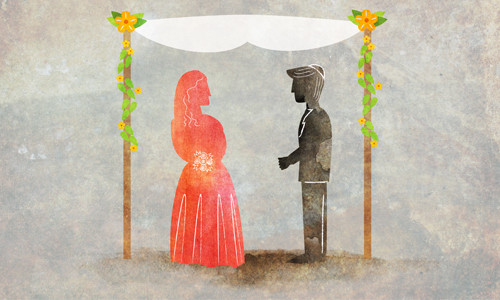In my last post, I covered some of the unique realities found in a Mesopotamian patriarchal society (unique to us at least). Today, I want to unpack this some more and see if this sheds additional light on the things we are reading. Let me say from the start that I am concerned this got a little “thicker” with detail than I expected, so if you get bogged down, just jump to the conclusion. I’ll try to be a little less “thick” in future articles.
So, knowing that the father ruled and that the inheritance was usually passed down through the eldest son and that having an eldest son was extremely important, let’s think about some of the marriages we find in Genesis and sum it all up with the interesting saga of Jacob, Leah, Rachel and Laban. As we do, keep in mind these points:

- Marriages were arranged by the fathers. Neither the son nor the daughter chose their spouse but the daughter could be given a voice in the matter (Gen 24:57-58).
- For the fathers, the marriage arrangement was a financial agreement, involving negotiations and proper completion. The marriage was only complete when both fathers fulfilled what they had promised.
- As part of the agreement, the bride’s father sent his daughter to the new family with a portion of his estate. Some consider this parting gift to be her share of the inheritance, since she would now receive all benefits from the new father (consider Leah and Rachel’s words in Genesis 31:14 and comments from the summary below).
- As part of the agreement, the groom’s father (or the potential groom) would also offer a gift, which was usually given in the form of possessions or time spent in service to the bride’s family. Even though this later came to be known as the “bride price”, this had nothing to do with paying for a woman to become one’s bride. Some scholars believe that, in its earliest form, the bride price was likely wealth that was to be held in trust so that, if the bride was one day abandoned or widowed, she would have something to fall back on. In Jacob’s case, Laban was to set aside the 14 years of wages he would have paid Jacob and held them in trust for his two daughters. It is interesting that later examples of the bride price do not always fit this use. Sometimes the bride price seems to be an expression of joy on the part of the groom or an expression of his desire to care for his bride or please the bride’s family.
Let me try to summarize with an example. Marriage arrangements were financial agreements that were filled with cultural expectations. The father of the bride would offer a dowry and the groom would offer a gift (the “bride price”). Jacob agreed to work 14 years for Leah and Rachel, but Laban kept delaying the marriage agreement so he would not have to provide dowries (it seems his wealth was shrinking while Jacob’s was increasing, Genesis 31:1-2, 5-7). In Genesis 31, Jacob told his wives, “Things have changed. Are you willing to leave?” Their reply includes all the points we just covered.
Rachel and Leah said that their father considered them to be foreigners and had sold them (because Laban received payment but had not offered a dowry). He had used up (and not held in trust) what Jacob had given for them. They then concluded that Jacob’s increased wealth (which came at cost to Laban) would serve as their dowry (their share in his inheritance). With this, the three of them concluded that the marriage negotiations were now complete and they were free to return to Canaan (Read Genesis 31:14-16).
These things sound strange to us but it was second nature to them. And it did not stop with the marriage agreement. These patriarchal customs and expectations ripple out into other stories as well.
Genesis 35:22 holds the story of Rueben and Bilhah. Since concubines were considered part of the inheritance given to the first born son, to sleep with dad’s concubine prior to his death was to usurp the father’s authority. Like the Prodigal Son asking for his inheritance before dad died, this was something that just wasn’t done!! Check out what Absalom did to David in 2 Samuel 16:21-22 and Jacob’s response to Rueben during the all-important blessing Genesis 49:3-4. Yes, these customs are weird to us, but it all made sense to them.
The Judah and Tamar episode also fits into this category (Genesis 38). By playing the prostitute and becoming pregnant through Judah, Tamar was “more righteous” than Judah (she was trying to find an heir for her late husband). In other words, she was doing the right thing according to the laws and customs of that time. In fact, one Hittite law even stipulates that if the brother of a deceased man cannot fulfill his duty then the widow should marry her late husband’s father! Such were the ways of this era. For more on this, check out a Bible Dictionary on “Levirate Marriage.”
Conclusion
In a clumsy way, I have tried to show how understanding even a little about that culture helps us see some of these “strange” stories in a new light. Abraham, Sarah, Isaac, Rebekah, Jacob, Rachel and Leah were all just average folks trying to live faithful lives before the God who called them and God showed them lots and lots of grace! Sounds a little like our story too.
The more I read the more I see how God was working out His grand story for them in their context and the more I am able to believe that He is also working out His grand story for us in ours, even when things may seem a little strange.
Enjoying the journey with you,

Rob






